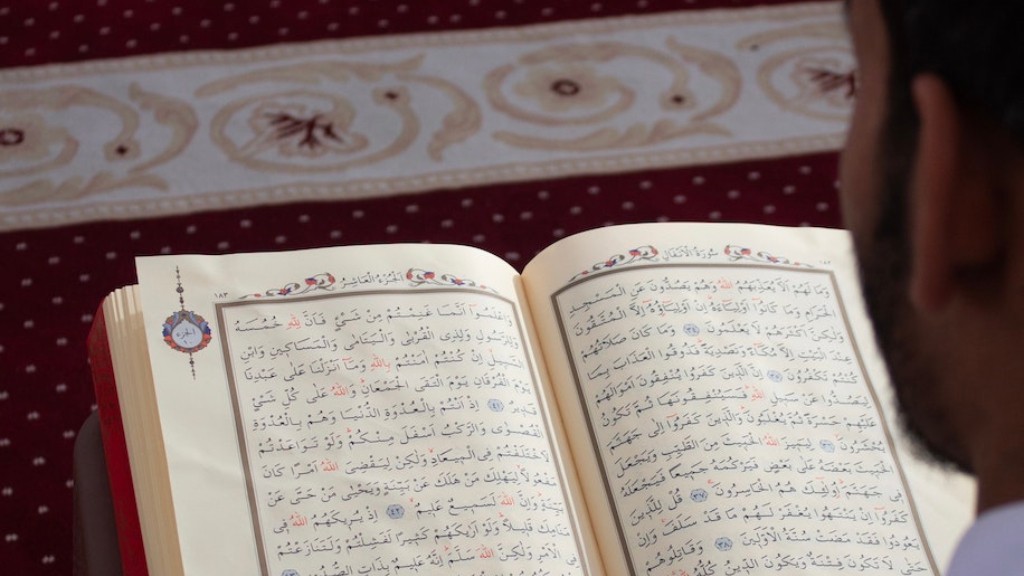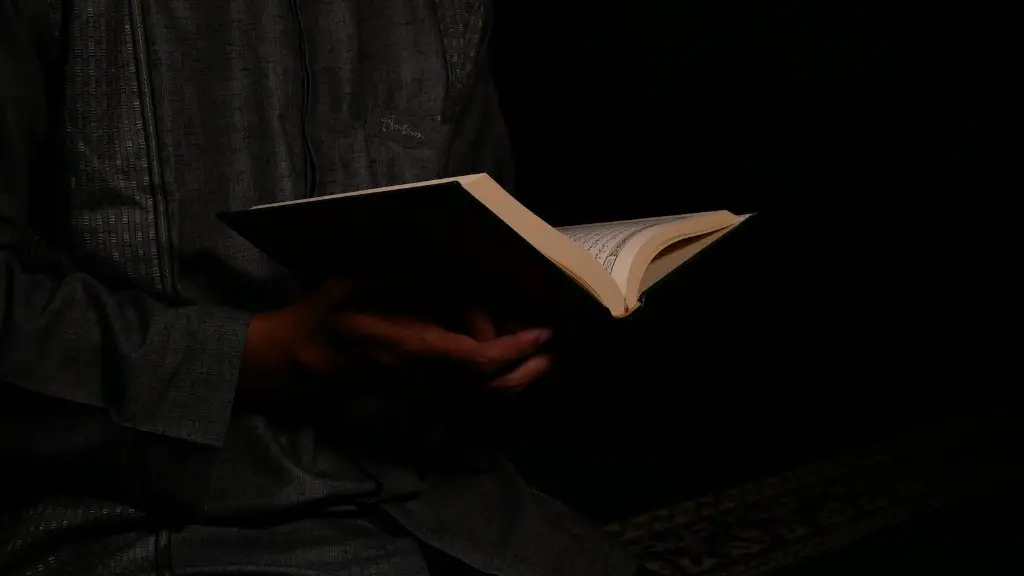What is the answer to the question – who is the supreme god in Hinduism? To find the answer, one must understand the complicated history of India and its ancient religion, Hinduism, which dates back over 5,000 years ago. Hinduism is widely believed to be the oldest religious system still practiced today, with multiple gods and many sects. This polytheistic religion is composed of thousands of gods and goddesses, but the most important is Brahman – a single, omnipresent ultimate truth that is the source of all beings and energies. Brahman is often referred to as the Supreme God, or creator of all things.
The concept of a supreme god is not a new one, as many religions have their own version of a single, powerful being. This can be seen in religions such as Christianity, Islam, and even Buddhism. Each of these traditions cite a single god or being who is at the top of the spiritual hierarchy, a being who is seen to possess ultimate power and control over all things. Hinduism is no different.
In Hinduism, Brahman is the ultimate reality and source of all of existence. According to its scriptures, Brahman is the creator of the universe and the ultimate source of all life. It is believed to be without a beginning or end, and not bound by any form or limitation. Brahman is said to be infinite and all-encompassing.
However, Hinduism is a complex and ancient religion, and its concept of a single, ultimate truth is not as simple as it seems. The concept of Brahman is often confused with the many other gods and goddesses of the religion, such as Vishnu, Shiva, and Ganesh. These gods, although powerful in their own right, are all seen as manifestations of Brahman – not the ultimate truth itself.
In addition, some Hindus also worship a single, personal god who is seen as an aspect of Brahman. This is often referred to as “Ishwara” or “Isvar”, and is considered to be a popular form of worship in many areas of India. While Ishwara and Brahman are both seen as the ultimate truth, Ishwara is not seen as the entire source of existence, but rather as an aspect of Brahman – a god that exists within Brahman.
So, who is the Supreme God in Hinduism? The answer is, of course, Brahman. Brahman is the ultimate truth and source of all things, and is the highest form of existence in the Hindu faith. It is believed to be infinite, all-encompassing, and capable of creating and sustaining the entire universe. While other gods and goddesses may be the focus of worship, Brahman is the source of all things and remains the most important in Hinduism.
The Trimurti
The Supreme God in Hinduism is often represented in the form of the Trimurti. The Trimurti is a three-headed god, with each head representing a different aspect of creation – Brahma, Vishnu, and Shiva. The concept of the Trimurti originated in the Vedic Age, and the concept of the three gods speaks to the complex nature of Hinduism and its many gods. The Trimurti is said to represent the cycle of creation, maintenance, and destruction, although each head is often worshipped individually as well.
Brahma is typically represented as the god of creation, associated with the creative force of the Universe. It is believed that he created the world from a single egg. Vishnu is the god of preservation, and is seen as a protector and sustainer of the world. He is often depicted as carrying a number of symbols and objects, and is sometimes portrayed with four arms. Shiva is the god of destruction, and is seen as the destroyer of evil and the destroyer of ignorance. He is said to be powerful enough to end the world and start anew.
The Trimurti is an important concept in Hinduism, and its representation of the Supreme God in the form of three powerful deities speaks to the power of Hinduism’s history and its complex faith. The Trimurti is a powerful reflection of the Hindu belief in a Supreme God and its many gods and goddesses.
The Caste System
The Supreme God in Hinduism is also represented in the form of the caste system. The caste system is an ancient social structure based on beliefs about the nature of spiritual beings, and is still practiced in India today. It is composed of four main classes – the Brahmin, Kshatriya, Vaishya, and Shudra – each of which has a distinct set of duties and responsibilities. The Brahmin class is highest in the hierarchy and considered to be the most spiritually enlightened of all four classes. It is believed that the Brahmin class is closest to the spirit of Brahman, which is seen as the ultimate source and spiritual force in the Hindu faith.
The caste system is an important part of Hinduism, and it highlights the complexity of the faith and its view of a Supreme God. While Brahman is seen as the ultimate source and power in the religion, the caste system shows that there is a hierarchy to the spiritual and temporal powers, and that not all beings or classes are equal in the eyes of god.
The caste system also gives insight into the Hindu view of karma and reincarnation. Hindus believe in a cycle of life, death, and rebirth, and that the individual’s actions in life determine their future in the next life. Those who live a life of service and devotion to Brahman will be reincarnated in higher classes and closer to the spirit of Brahman. The caste system is thus a reflection of the Hindu view of hierarchy and spiritual power.
Conclusion
In conclusion, the Supreme God in Hinduism is Brahman, the ultimate truth and source of all things. Brahman is often confused with other gods and goddesses in Hinduism, as well as the concept of Ishwara or a personal god, but Brahman remains the ultimate power and source of all existence. Brahman is often represented in the form of the Trimurti or the caste system, and its representation speaks to the complexity and powerful history of Hinduism’s faith.
Modern Practices in Hinduism
While the core concepts and beliefs of Hinduism are largely unchanged since ancient times, the religion has certainly changed in some ways to accommodate a more modern interpretation. In particular, Hinduism has become more accepting of other religions and less rigidly adherent to traditional religious concepts and practices. This is in part due to the increasing globalization and interaction between different cultures, but also due to the more modern interpretations and applications of Hindu religious beliefs.
For example, many Hindus now practice meditation as a way of communicating with the divine spirit or Brahman. This practice is still rooted in ancient Indian traditions, but it is often seen as a way of tapping into modern spirituality and gaining insight into one’s inner self. Similarly, yoga is a widely popular mediation and exercise practice, and is seen as a way of connecting with one’s spiritual side.
Hinduism has also become more accepting of different gods and goddesses from other religions, such as Christianity and Islam. Many Hindus believe that all gods are one and the same, part of the greater Brahman, and thus worthy of respect. This can be seen in the increasing popularity of interreligious festivals and rituals, as well as the more frequent incorporation of other religious symbols into Hindu traditions.
It is clear that Hinduism has changed over time to accommodate a more modern interpretation and application of its teachings. It is important to recognize the complexity of Hinduism and the multiple interpretations that exist within the faith – none of which necessarily detract from the central belief in a Supreme God or the ancient spiritual traditions of India.
Religion in Modern India
In modern India, Hinduism is still a widely practiced religion. Despite the changes that have taken place over time, Hinduism still remains at the core of Indian culture and spiritual life. In recent years, India has become increasingly secular and more open to different faiths and beliefs. This can be seen in the rising number of religious minorities and the various cultural festivals that take place throughout the nation.
However, Hinduism still holds a special place in the hearts of many Indians, as it is part of their cultural heritage. Hindus typically practice their faith in the form of rituals and festivals, with religious customs and beliefs still held in high regard. Hindus also have a strong presence in politics, as Hindu nationalism is still seen as a powerful force in the nation.
Despite the increasing secularization of Indian society, Hinduism is still an important part of life in India. It is a complex and ancient faith, with a deep and nuanced understanding of the divine and a belief in a Supreme God. Hindus continue to practice their faith in various ways, while still remaining open to new interpretations and modern practices.
The Influence of Hinduism
Hinduism has had a profound influence not only on Indian society but on the entire world. The religion has had an effect on the development of many other religions, particularly Buddhism and Jainism, which were both heavily influenced by Hinduism. Similarly, Hinduism has had a major influence on other faiths that originated in India, such as Sikhism and Baha’i.
Hinduism has also had an impact on Eastern philosophy and literature, particularly in terms of the concept of karma and reincarnation. Other Eastern philosophies, such as Taoism, have also been influenced by the Hindu belief in spiritual power and the presence of a Supreme God. The concept of meditation, for example, is a direct result of Hindu practices.
Hinduism has also had a significant influence on the Western world, particularly in terms of literature and popular culture. Many writers and artists have been heavily influenced by the spiritual power of Hinduism and its complex philosophy. The works of writers such as Hermann Hesse and William Blake, for example, are often filled with references to Hindu ideas and beliefs. Similarly, the literary works of authors such as J.R.R. Tolkien and C.S. Lewis were heavily shaped by Hinduism’s spiritual concepts.
From its ancient history to its modern-day influence, Hinduism is a complex and powerful religion. Its belief in a Supreme God and its vast array of gods and goddesses have had a major impact on the world, and its teachings and philosophy continue to shape the spiritual development of the entire human race.

